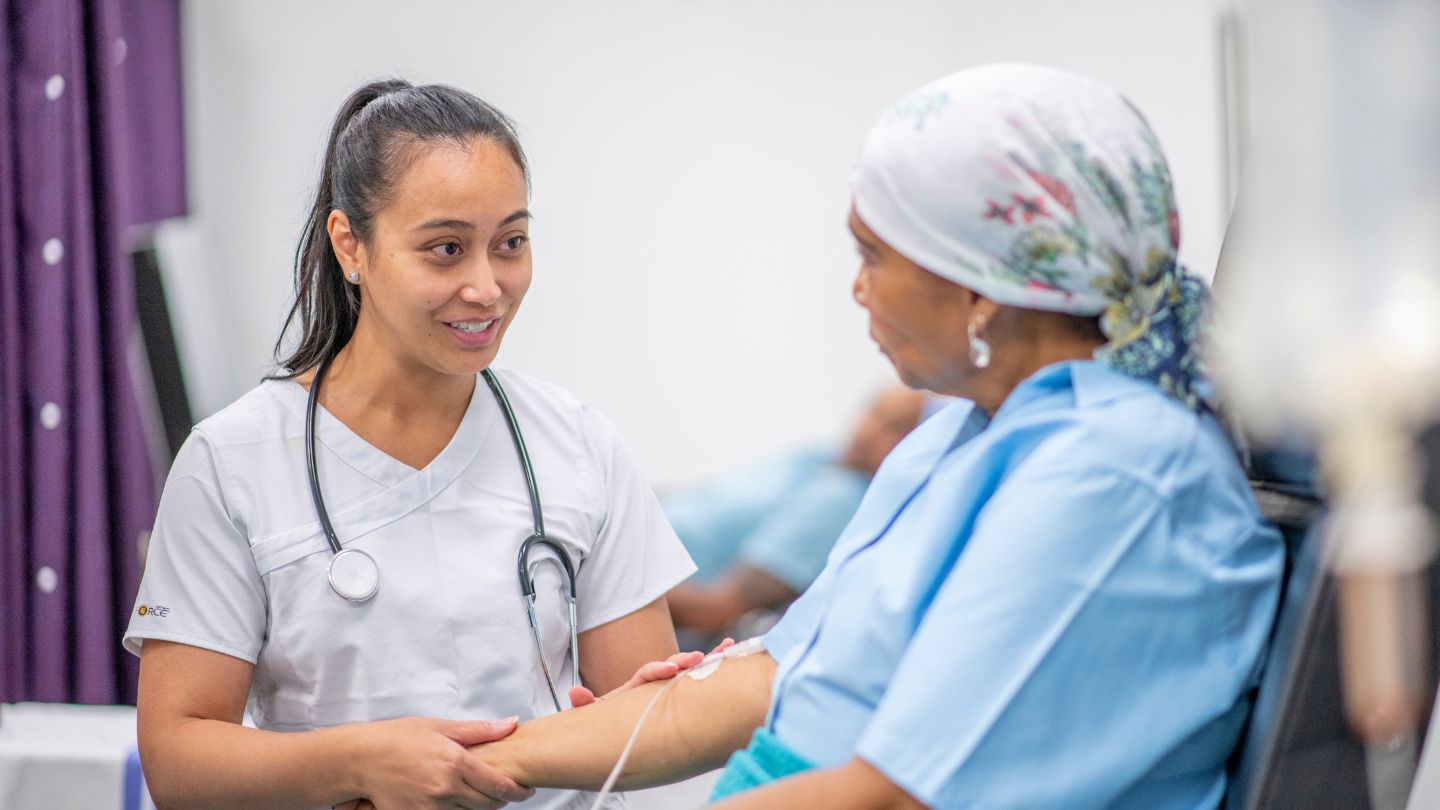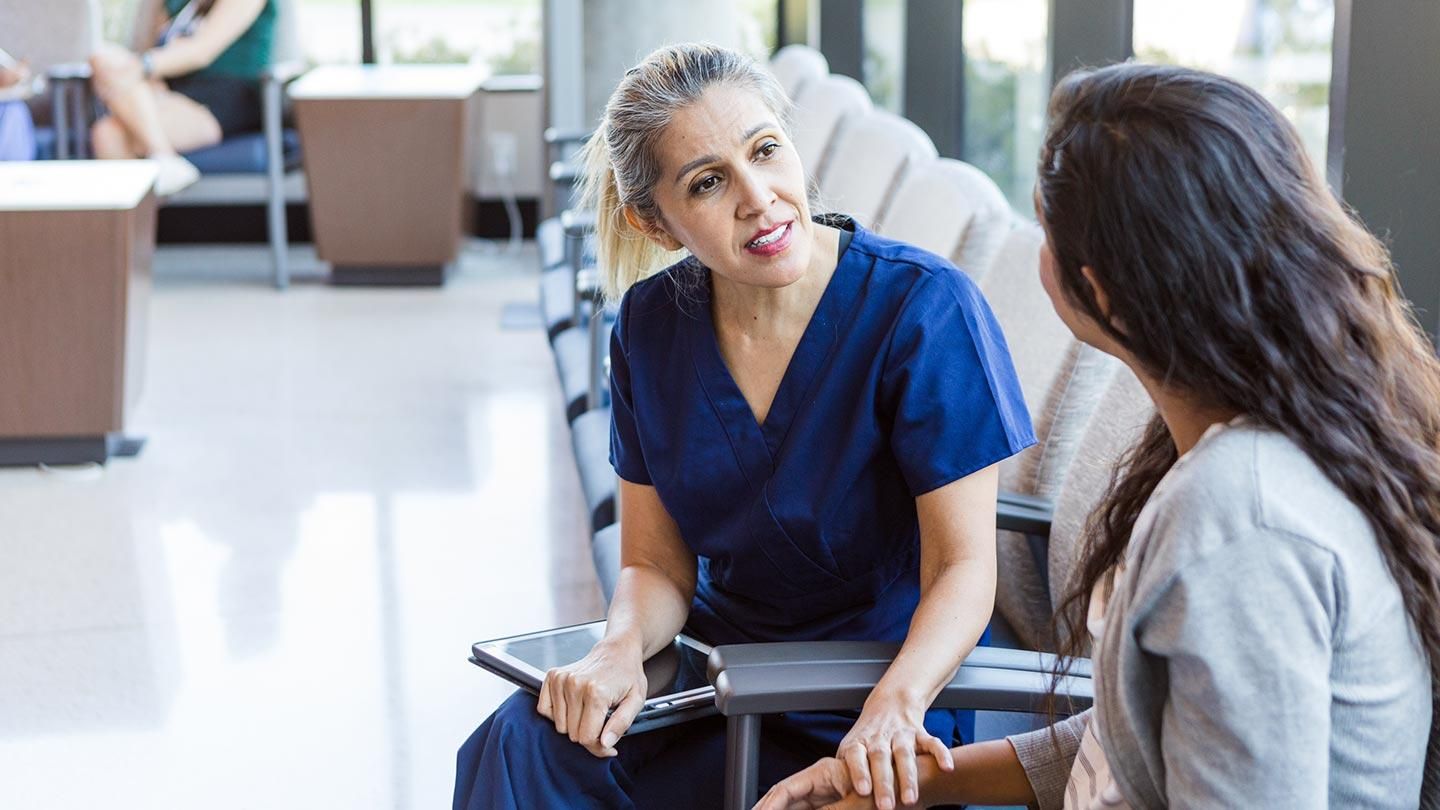
This guide will elucidate the various specializations within oncology nursing, all designed to cater to the individual requirements of cancer patients. It aims to provide insight into the different responsibilities and specialized knowledge that oncology nurses possess, ranging from dealing with pediatric cases to administering chemotherapy, highlighting their critical roles in patient care.
Key Takeaways
- Oncology nurses play a vital role in cancer care by providing comprehensive support throughout patients’ cancer journeys, from diagnosis to end-of-life care.
- There are various specializations within oncology nursing, including pediatric oncology, radiation oncology, chemotherapy, and bone marrow transplantation, each requiring specific training and expertise.
- Certification, such as the Oncology Certified Nurse (OCN) credential, enhances career advancement opportunities for oncology nurses and ensures high-quality patient care through ongoing education and specialization.
Overview of Oncology Nursing
Oncology nursing is a specialized field dedicated to caring for cancer patients and those at risk of developing cancer. The primary focus of oncology nurses is on the delivery of cancer treatment, which includes administering chemotherapy, radiation, and other therapies. These nurses are involved at every stage of the cancer journey, from diagnosis and treatment to survivorship, remission, and end-of-life care. Their role is crucial in providing life-affirming care and improving the quality of life for cancer patients.
To become an oncology nurse, it is essential to obtain a nursing degree and pass the National Council Licensure Examination (NCLEX), as these are critical steps for licensure and professional practice.
One of the most critical aspects of oncology nursing is the comprehensive support provided to patients and their families. Oncology nurses offer not only medical care but also emotional support and education on cancer and its treatments. They help patients understand their diagnosis, navigate treatment options, and cope with the emotional and psychological challenges that come with cancer. This holistic approach ensures that patients and their families feel supported and informed throughout the cancer journey.
Oncology nursing is a rapidly evolving field driven by landmark scientific breakthroughs in cancer treatment. Over the past few decades, novel discoveries have led to revolutionary treatments that have significantly impacted oncology care. These advancements have created a growing need for specialized oncology teams to provide tailored care for individuals diagnosed with cancer. Oncology nurses are at the forefront of these changes, continuously updating their skills and knowledge to keep pace with new cancer treatments.
Oncology nurses work in diverse environments, such as:
- hospitals
- cancer centers
- outpatient clinics
- doctor’s offices
- hospices
- nursing homes
The diversity of work environments allows oncology nurses to provide specialized care tailored to the unique needs of cancer patients in different settings. Whether in a bustling hospital oncology unit or the comfort of a patient’s home, oncology nurses play a vital role in the comprehensive care of cancer patients.
Types of Oncology Nurses

The field of oncology nursing is diverse, with different sub-specialties dedicated to catering to the unique requirements and treatment approaches of cancer patients. Specializations within oncology nursing include pediatric oncology, radiation oncology, chemotherapy, bone marrow transplantation, and breast oncology.
In each of these areas, there are specific roles that come with their own set of responsibilities. For instance, a radiation oncology nurse focuses on the care of patients undergoing radiation therapy, helping them manage the side effects associated with daily radiation treatments. To effectively meet the various challenges presented by patient care in these specialties, specialized training is essential for those working within the domain of cancer treatment and patient support.
Pediatric Oncology Nurses
Oncology nurses specializing in pediatrics deliver care specifically tuned to the physiological and psychological requirements of children battling cancer. Their vital role encompasses providing robust support for these young patients and their loved ones throughout the daunting process of undergoing cancer treatments. Whether they are applying therapies tailored for children or observing potential adverse effects, these nurses strive to ensure top-notch care for their pediatric patients.
Emotional backing is yet another facet provided by pediatric oncology nurses, assisting families in dealing with both the mental strain that arises from a child’s diagnosis and ongoing treatment. They equip families with educational tools and resources aimed at navigating through stressors tied to a youth’s battle against cancer. By catering to both emotional well-being and physical health needs, pediatric oncology nurses cultivate an atmosphere conducive to recovery and fortitude.
Well-versed in administering child-centric treatments such as chemotherapy or cutting-edge therapeutic approaches, these specialized nurses vigilantly track side effects while also fine-tuning treatment protocols responsive to each child’s individual response. This specific expertise confirms that nursing care delivered by pediatric oncologists is not only effective but also customized for the safety of their adolescents.
Pediatric oncology nursing reaches past patient interaction within hospital settings. It involves collaboration across diverse healthcare disciplines so as to orchestrate comprehensive management plans focused on all aspects pertinent to juvenile health outcomes. In alliance with various medical experts, they play an instrumental part in crafting collective strategies designed around enhancing life quality during challenging times brought forth by confronting childhood cancers.
Radiation Oncology Nurses
Oncology nurses specializing in radiation are pivotal in educating patients about the intricacies and potential side effects of radiation therapy. Their duties include elucidating the treatment regimen, fielding inquiries, and offering comfort. Such educational support is essential as it enables patients to be better informed and reduces their anxiety regarding their therapy.
These oncology nurses not only oversee the administration of radiation treatments but also work closely with oncologists who specialize in radiation to guarantee the precise and secure delivery of such therapies. They vigilantly observe any adverse reactions from the patient and address complications that may emerge during the course of treatment.
These nursing professionals take charge of imparting knowledge about various aspects of care post-treatment to patients while managing any ensuing side effects. This includes conducting ongoing evaluations and modifying care strategies based on how a patient reacts to their treatment. Through all-encompassing support services, oncology nurses skilled in radiation aid patients through each hurdle presented by their cancer journey.
Chemotherapy Nurses
Nurses who specialize in chemotherapy are skilled in the safe delivery and management of cancer treatments, paying close attention to drug interactions and necessary safety measures. Their pivotal role entails administering intricate chemotherapy regimens with a deep knowledge that is crucial for patient safety during treatment. These oncology nurses diligently observe patients throughout their chemotherapy appointments, attentively addressing any negative reactions that might arise.
Expertise in both delivering chemotherapy and handling its associated side effects is imperative for oncology nurses, necessitating specialized training. Nurses involved with chemotherapy have been trained to identify and react swiftly to potential complications, thereby ensuring that patients benefit from the highest level of care possible. Such proficiency is indispensable in safeguarding patient well-being while also maximizing the effectiveness of treatment outcomes.
For those working as oncology nurses within the realm of chemotherapeutic care, it’s essential to possess a comprehensive grasp of how various drugs interact and adhere strictly to established safety protocols. Vigilance becomes paramount when tracking patient responses during therapy sessions and modifying therapeutic strategies accordingly when needed. The specific skill set these nurses bring plays an instrumental role not only in enhancing security but also in facilitating successful therapy results for individuals being treated for cancer.
Bone Marrow Transplant Nurses
Nurses specializing in bone marrow transplants are dedicated to delivering intensive care prior to, during, and following the transplant procedure. They emphasize aiding patient recuperation while vigilantly monitoring for any adverse complications that might arise. These nurses shoulder the responsibility of priming patients for their transplants as well as handling difficulties that may emerge post-transplant, which is key to confirming that patients are accorded premier treatment through every step of their transplantation journey.
Throughout each phase of the transplant process—starting with preparatory stages leading up to surgery and extending into crucial aftercare support—bone marrow transplant nurses remain intimately involved with patient welfare. Their continuous provision of care throughout a patient’s recovery is instrumental in surmounting transplantation hurdles and steering toward favorable outcomes. The role inhabited by a marrow transplant-certified nurse proves indispensable within this entire framework.
Tasked with equipping patients for impending bone marrow transplant procedures and providing essential attention during convalescence periods aimed at averting complications, these nurses attentively track any indications pointing toward graft rejection or other serious consequences. Tailoring caregiving approaches accordingly reinforces optimal healing conditions. In rendering all-encompassing expertise-driven assistance, bone marrow transplant nurses solidify themselves as pivotal contributors throughout the success-laden narrative bound within a rigorous transplantation protocol.
Certified Breast Care Nurses
Nurses who have attained the status of certified breast care nurse (CBCN) possess specialized expertise in tending to patients with breast cancer. They bring a wealth of skills and knowledge specifically tailored to instruct, support, and manage the care of individuals at different phases of their treatment for breast cancer, guaranteeing that each patient benefits from thorough and individualized attention.
By acquiring CBCN certification, nurses affirm their dedication to delivering superior standards of care by staying abreast with progressive developments within the realm of breast cancer treatments. This qualification equips them to confront the distinct complexities encountered by patients battling breast cancer effectively — playing a pivotal role in enhancing patient support and health outcomes.
Role of Oncology Certified Nurse (OCN)
Nurses certified in oncology are critical to the delivery of cancer care, offering expert knowledge and abilities to assist patients during their fight against cancer. They take on the responsibility of creating personalized plans for patient care, informing patients about different treatment possibilities, and orchestrating multidisciplinary care coordination.
These nurses keep track of how patients respond to treatments, handle any adverse effects that may arise from therapy, and offer emotional encouragement not only for the individuals facing cancer but also for their families.
Certification Process
To embark on a career as an oncology nurse, one must first complete an accredited nursing program, which may be an Associate degree or Bachelor’s degree in Nursing. After obtaining a nursing degree, it is necessary to pass the National Council Licensure Examination (NCLEX) and secure state RN licensure. Many employers prefer candidates who hold a Bachelor of Science in Nursing (BSN), and it’s advantageous to accumulate two to three years of experience working with cancer patients before pursuing a specialization in oncology.
For nurses aspiring to earn Oncology Certified Nurse (OCN) certification, they are required to fulfill at least 2,000 hours of adult oncology nursing practice within four years prior to applying and obtain no less than ten continuing education contact hours related specifically to oncology over the past three years. The OCN designation can be obtained from the Oncology Nursing Certification Corporation (ONCC), which involves passing a rigorous exam that presents 165 multiple-choice questions across three hours.
Achieving this certification validates that oncology nurses possess specialized knowledge and skills crucial for delivering superior care to individuals battling cancer. Obtaining OCN certification signifies an unwavering commitment amongst these healthcare professionals towards excellence in their field, as well as ongoing dedication toward learning advancement and professional growth within nursing focused on caring for those affected by cancer.
Benefits of Certification
Achieving certification can pave the way for increased professional growth and esteem among peers in the field of oncology nursing. An OCN (Oncology Certified Nurse) credential ensures that nurses possess distinct expertise, which is crucial in elevating the standard of care provided to patients with cancer. This qualification opens new avenues for career progression while recognizing a nurse’s dedication to delivering superior oncology patient care.
In their role, clinical nurse specialists within the realm of oncology concentrate on enhancing outcomes for those they serve by engaging in research and furthering educational efforts. Through acquiring advanced certifications, nurses specializing in oncology are empowered to assume pivotal leadership positions and have an influential hand in shaping best practices pertaining to cancer treatment. Such dedication towards continuing education and professional development serves as a testament to their commitment, ultimately resulting in improved healthcare delivery standards enjoyed by patients grappling with cancer challenges.
Responsibilities of OCNs
Nurses certified in oncology play an instrumental role in delivering multifaceted care to individuals suffering from cancer. Their duties encompass overseeing the health status of patients, managing medication and chemotherapy regimens, formulating individualized treatment plans, and imparting knowledge to both patients and their families regarding the illness and its management strategies. Such involvement by OCNs is pivotal for equipping patients with adequate information and tools for effective self-care.
These specialized nurses are also attuned to the psychological requirements of those they attend to, serving as staunch advocates within patient care scenarios. In collaboration with a diverse healthcare team comprising various professionals, OCNs diligently work towards synchronizing comprehensive approaches designed around the specific needs of each patient—this synergy being paramount for streamlining impactful treatment protocols that aim at enhancing patient experiences as well as clinical outcomes.
In their endeavor to unify therapeutic efforts among different medical stakeholders toward centered care surrounding the patient’s welfare, Oncology Certified Nurses significantly influence practice guidelines within oncology nursing realms. Engaging actively not only in hands-on caregiving but also assuming responsibilities tied with administrative spheres endorses these nurses’ vital presence on any cancer therapy-oriented team due precisely to their expertise paired with unwavering dedication toward nurturing excellence across all facets of oncological healthcare provision.
Work Environments for Oncology Nurses

Oncology nurses operate within diverse environments, such as hospitals, cancer centers, outpatient clinics, and home care settings. Each of these venues offers distinct opportunities and challenges in delivering specialized care to patients with cancer. In their work across these various locations, oncology nurses must adapt their patient care strategies and effectively collaborate with other members of the healthcare team.
Hospitals and Cancer Centers
In hospitals and cancer centers, oncology nurses work collaboratively with interdisciplinary teams to deliver comprehensive patient care. These teams often include oncologists, radiation therapists, pharmacists, and other specialists who contribute to the patient’s treatment plan. Effective teamwork is crucial for ensuring that all aspects of the patient’s care are addressed and optimized.
Oncology nurses in these settings are responsible for administering treatments, monitoring patient progress, and managing side effects. They also play a vital role in educating patients and their families about the treatment process and what to expect. This education helps alleviate anxiety and empowers patients to take an active role in their care.
Collaboration with pharmacists is particularly important in hospitals and cancer centers to ensure the safe administration of medications. By working closely with pharmacists, oncology nurses can provide accurate and timely medication management, reducing the risk of errors and improving patient outcomes.
Outpatient Clinics
In outpatient clinics, oncology nurses are involved in ongoing treatment and follow-up care for cancer patients. These clinics provide a more relaxed and accessible environment for patients to receive their treatments and continue their care. Oncology nurses in outpatient clinics focus on delivering ongoing care and regular follow-ups, emphasizing continuity of care.
Post-discharge oncology patients often face challenges with managing complex treatment plans, which necessitates robust remote care support. Guideway Care assists patients in arranging transportation, coordinating follow-up care, and managing medications after hospital discharge. This support ensures that patients can continue their treatment smoothly and effectively.
Oncology nurses in outpatient clinics also take on diverse responsibilities, including treatment administration, patient education, and navigation through the healthcare system. They play a critical role in helping patients understand their treatment options, manage side effects, and adhere to their care plans.
Home Care and Hospice
Oncology nurses operating in hospice and home care environments deliver empathetic end-of-life care tailored to patients within the comfort of their personal abodes. They are dedicated to enhancing comfort and maintaining quality of life for those facing terminal illnesses, extending emotional support and solace during such critical times. These settings enable oncology nurses to cultivate profound connections with both patients and their loved ones, leading to a deeper level of supportive healthcare.
Within the sphere of home care, these specialized nurses cater directly to both the emotional welfare and physical necessities of their charges. Collaborating intimately with patient families, they meticulously craft personalized plans centered on preserving dignity as well as alleviating discomfort—a commitment that ensures top-tier medical attention is delivered where individuals feel most at ease: in their own homes.
In essence, working from either a hospice or residential standpoint allows oncology nurses an opportunity vital for delivering indispensable reinforcement along with heartfelt consolation when confronting life’s ultimate threshold. As providers not just of palliative intervention but also psychological reassurance, these caregivers play a pivotal role in assisting both patients as well as relatives throughout this journey—always aiming towards facilitating serenity-filled closures imbued with significance.
Skills and Qualities of Successful Oncology Nurses

Oncology nurses must possess a distinct set of technical skills, along with the capacity to offer emotional support and work collaboratively. These attributes are critical in delivering thorough and empathetic care to individuals with cancer as well as their loved ones.
By cultivating these competencies, nurses specializing in oncology can achieve excellence within their field and profoundly influence the lives of the cancer patients they care for.
Technical Skills
Oncology nurses are required to possess critical technical abilities such as:
- Proficiency in IV administration, a pivotal technique for the direct infusion of medications and fluids into a patient’s bloodstream.
- Extensive drug knowledge encompassing an intricate awareness of medication interactions, potential side effects, and adherence to safety protocols that guarantee both effective treatment regimens and heightened patient protection.
- Diligent observation of safety precautions is essential not only for safeguarding the health of patients but also for healthcare providers themselves.
These competencies are indispensable components when delivering premium care within the realm of oncology nursing.
Mastering infection control stands out as another imperative skill set for nurses specializing in oncology. This expertise entails implementing rigorous measures against infections, which can be particularly hazardous to those with compromised immune systems resulting from their ongoing treatments. Through unwavering compliance with these protective practices, oncology nurses play an instrumental role in forestalling additional health complications, thereby upholding their patients’ well-being throughout successive stages of therapy.
Emotional Support
Oncology nursing involves providing critical emotional support assisting patients and their loved ones in managing the trials associated with cancer care. It is essential for oncology nurses to advocate on behalf of the patient by ensuring individual needs are met and that any concerns they might have become an integral part of the decision-making process regarding their treatment. Clear communication from these nurses plays a vital role in guiding both patients and caregivers through the complexities of medical information pertaining to cancer treatments.
In delivering comprehensive care, nurse practitioners specialized in oncology contribute immensely not only to the physical but also to the psychological well-being of those affected by cancer. Those certified as Breast Care Nurses offer invaluable education along with emotional support throughout each phase encountered during breast cancer management. The capability to provide steadfast emotional support necessitates oncology nurses being equipped with significant resilience and inner strength.
Being alert to indications of psychological strain enables these healthcare professionals within oncological settings to swiftly intervene with appropriate psychological assistance when needed. With adeptness at grief counseling techniques, such compassionate nurses help imbue comfort and hope into the lives of patients amidst challenging circumstances surrounding their condition, offering much-needed solace along this difficult journey.
Collaboration
Oncology nurses work intimately with interdisciplinary teams, engaging with various specialists to deliver holistic care for patients. Oncology Certified Nurses take on the critical task of developing and executing personalized treatment plans that cater to the specific requirements of each patient. This partnership is crucial in delivering coherent and successful treatment for cancer.
Clinical nurse specialists within the oncology field concentrate on boosting the standard of care by integrating research findings and evidence-based practices into their routines. By focusing on domains such as palliative care, they contribute significantly to enhancing patient results while also increasing job satisfaction among nursing staff specializing in oncology.
Those who assume leadership positions among oncology nursing professionals often play a pivotal role in shaping policies that impact both patient treatment procedures and overall nursing practice standards within oncology settings.
Final Thoughts
Oncology nurses play a vital role in the complex landscape of cancer care. From providing medical treatment to offering emotional support and education, these professionals ensure patients and their families are well-supported during challenging times. The various types of oncology nurses, each with specialized skills and focus areas, highlight the importance of their contributions across different stages of cancer treatment. With continued education and certifications, oncology nurses not only advance their careers but also enhance patient outcomes, underscoring their significant impact on healthcare.
At Guideway Care, we partner with healthcare providers to address critical health-related social needs through innovative solutions like the oncology navigator model. By offering post-discharge support and care guidance, we help improve patient experiences and outcomes at every stage of the cancer journey. Ready to elevate your care delivery? Learn how we can support your oncology team and transform patient care. Contact us to get started!
Frequently Asked Questions
How does one become an oncology nurse?
To become an oncology nurse, you must complete an accredited nursing program, obtain a nursing degree, pass the National Council Licensure Examination (NCLEX), and gain experience with cancer patients.
Obtaining additional certification, such as the OCN, is also advisable.
What are the main responsibilities of an Oncology Certified Nurse (OCN)?
An Oncology Certified Nurse (OCN) primarily monitors patient conditions, administers treatments, educates patients and families, coordinates care, and offers emotional support throughout the cancer journey.
These responsibilities ensure comprehensive patient care in oncology settings.
What advanced practice roles are available in oncology nursing?
Oncology nursing encompasses advanced practice roles such as Oncology Nurse Practitioners and Clinical Nurse Specialists, who collaborate with physicians to diagnose and treat patients. These positions require additional education and certification to qualify.
Specialized knowledge and skills in oncology acquired by these advanced practice nurses significantly improve the care provided to patients with cancer.


